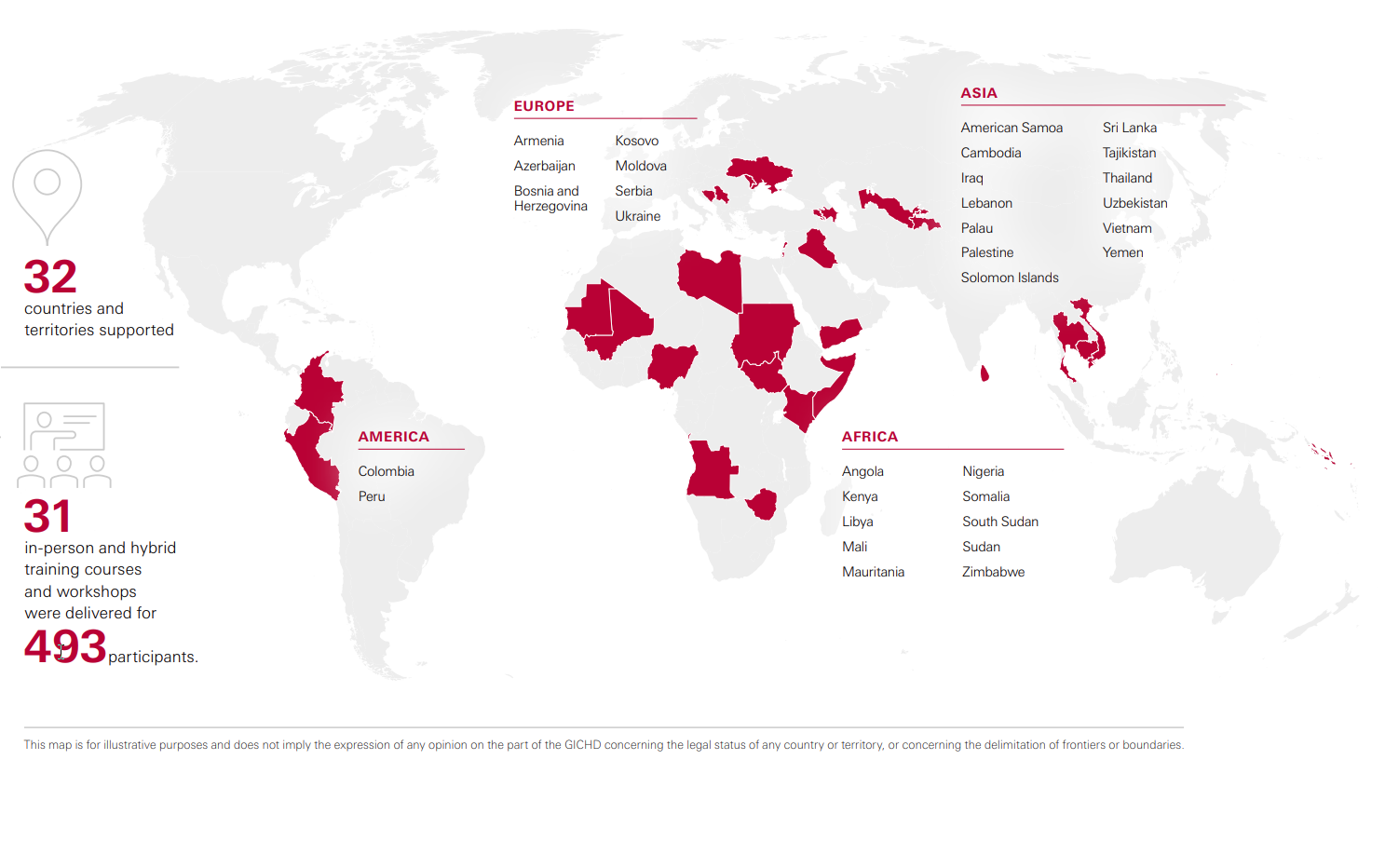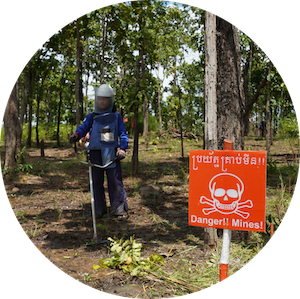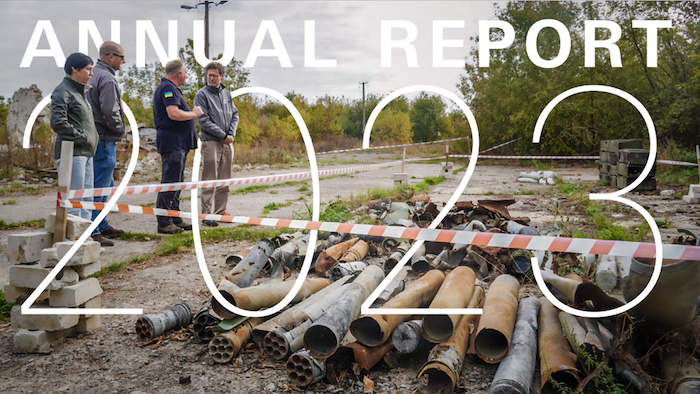01
Foreword
Every year and across the world, explosive ordnance (EO) threatens the lives of millions of people. Lives are lost; survivors and their families struggle with the physical, psychological, social, and economic consequences of EO accidents. Since 1998, the GICHD has been working towards reducing risks to individuals and communities caused by EO.
Read more
2023 marked the 25th anniversary of the GICHD - founded upon a Swiss initiative to promote international cooperation in humanitarian demining. For the past 25 years, the GICHD has played a crucial role in helping to develop and professionalise explosive ordnance risk reduction. Unfortunately, there is no light at the end of the tunnel: there is still so much to be done to address challenges caused by anti-personnel mines and other EO. The presence of EO is a threat to the safety and well-being of individuals. In addition, it is a key obstacle to the timely and effective delivery of humanitarian aid, post-conflict stabilisation, recovery and reconstruction, peace, and sustainable development.
Last year, the GICHD entered its new 2023–2026 strategic cycle, building on progress and lessons learnt from 25 years of support to mine action. The Centre supported 32 countries and territories along its four, interconnected lines of service, adapting its support as needed. 21 donor countries made our work possible.
Targeted activities strengthen our partners’ knowledge, skills and capacities. These fundamental efforts have included tailored technical advice, the delivery of training courses as well as the organisation of workshops, covering most of the Centre’s broad expertise. Our coworkers are experts in strategic planning; standards development; ammunition management; gender, diversity, equality, and inclusion; land release, explosive ordnance risk education and information management. Moreover, they are experienced in integrating mine action in broader sustainable development frameworks. In line with its needs-driven approach, the GICHD’s support was built on baseline and needs assessments assuring tailored and effective responses.
To enable the sector constantly to evolve and adapt, the GICHD continued to devote significant resources to research and development, to knowledge generation and to the production of good practice guidelines and tools, providing the basis for effective and efficient action. Thus, the Innovation Conference organised by the Centre in November 2023 in Geneva showcased new technologies and provided a unique platform to discuss current EO risk reduction challenges.
At the global level, the GICHD continued to support the implementation of relevant conventions and commitments. It provided expert input and helped to develop, review, and update global standards and guidelines in both mine action and ammunition management. Finally, the GICHD promoted dialogue and cooperation, including at the regional level, disseminating good practice, key tools and resources adapted to regional needs.
Our commitment and dedication build on our extensive experience and expertise and will continue to make a difference in this world. Working towards our goal of a world free from EO, where communities thrive, would not be possible without the support of our donors, the dedication of our coworkers and the collaboration with our partners. Our sincere thanks go to every one of them.
Dr Barbara Haering
GICHD President
Ambassador Stefano Toscano
GICHD Director

Dr Barbara Haering
President of the Council of Foundation

Ambassador Stefano Toscano
GICHD Director
02
2023 in Review
The GICHD works to reduce risks to communities stemming from explosive ordnance, with a focus on landmines, cluster munitions, explosive remnants of war, and unsafely and insecurely managed conventional ammunition.
Watch some of our key 2023 moments. Read more in our 2023 Annual Report.
03
Results at a glance
1. Multilateral processes are informed by evidence and supported by expert advice

- 6 multilateral processes informed/supported by the GICHD to develop and implement legal and political commitments:
- APMBC, CCM, CCW Amended Protocol II, NDM, Global Framework on Conventional Ammunition, ATT
- 1 APMBC extension request and 2 CCM extension requests reflect the GICHD’s inputs:
- Ukraine; Iraq, Mauritania
- 1 Intersessional Meeting organised (APMBC)
- 41 interventions in official meetings:
- 24 statements in official meetings
- 7 interventions upon invitation
- 10 side events (co)organised
- The GICHD’s expertise is acknowledged by stakeholders in multilateral processes
- At least 63 references to GICHD substantive support and 5 references to GICHD logistical support
2. National responses are framed by strategies, regulated by up-to-date standards, and enabled by information management

- 1 Strategy developed: Sri Lanka
- 2 Strategies implemented: Iraq, Sri Lanka
- 6 Strategies reviewed: Armenia, Moldova, Ukraine, GFFO, Nigeria, Zimbabwe
- 3 IMAS, 2 IATGs, 7 NMAS developed
- 8 IMAS, 16 NMAS revised
- 3 well-functioning IM systems established: Cambodia, Libya, Yemen
- 1 IM capacity improved: Yemen
3. Operations are implemented safely, effectively, and efficiently

- 3 countries supported with the enhancement of ammunition management operational capacity:
- Moldova, Peru, Ukraine
- Operational systems, methods, tools and approaches developed or promoted by the GICHD were implemented by countries/other partners.
4. Gender and diversity are mainstreamed, and equality and inclusion promoted in explosive ordnance risk reduction

- 1 country has established a well-functioning gender and diversity capacity with the GICHD’s support:
- Cambodia
- 3 countries supported with establishing a well-functioning gender and diversity capacity:
- Iraq, South Sudan, Yemen
- People from diverse groups were represented in GICHD-organised events.
- Gender and diversity mainstreaming was implemented by the GICHD and its supported countries/partners.
5. The impact of explosive ordnance risk reduction is enhanced through connections with global agendas

- 7 countries/territories connected explosive ordnance risk reduction and global agendas in national strategies with the support of the GICHD:
- Canada, South Sudan, Somalia, Sweden, Iraq, Kosovo, Zimbabwe
- 1 region connected explosive ordnance risk reduction and global agendas with the support of the GICHD:
- ASEAN (Cambodia, Brunei, Malaysia, Singapore, Myanmar, Philippines, Thailand, Lao PDR, Vietnam)
- The GICHD contributed to enhancing the evidence connecting explosive ordnance risk reduction and global agendas.
04
A focus on
COUNTRY-BASED APPROACH: UKRAINE
Ukraine had one of the highest casualty rates in Europe in 2021, from contamination caused by the conflict in Donbas in 2014–2015 which led to the establishment of a mine action programme, under the leadership of the Ministry of Defence.
The GICHD has been working with local authorities since 2012, building partnerships with national, regional and international actors and actively supporting the Ukrainian government in formalising mine action structure and processes. Soon after the escalation of the conflict in 2022, the Centre intensified its support to strengthen and professionalise existing national capacities and meet the increased demand for humanitarian demining.
Between 24 February 2022 and 24 September 2023, the OHCHR recorded over 300 confirmed civilian casualties from mines and explosive remnants of war alone. It recorded a further 20,000 casualties caused by explosive weapons. The increased EO contamination is posing a threat to civilians’ lives and livelihoods, highlighting the critical importance of EORE. In 2023, the GICHD initiated an EORE mapping survey to collect and share good practices for behaviour change in the country.
In the field of information management, the GICHD focused its efforts on enhancing and maintaining the Information Management System for Mine Action (IMSMA) which continued to function with almost no interruption despite the active conflict. IMSMA supports Ukraine in building the foundation for effective and efficient humanitarian demining operations. To this end, it aims to enable the mine action programme to aggregate, interpret and share data across partners and sources and to map areas where EO contamination is identified.
The GICHD continued to provide technical support to the Ukrainian national mine action authorities to enhance their capacity in operational matters. In consultation with the national authorities, the GICHD amended its approach to technical training, ensuring that all thematic courses were delivered on site and tailored to the context.
To make the work on national capacity more sustainable, the GICHD delivered training of trainers courses on non-technical survey (NTS) and quality management (QM) in partnership with accredited mine action operators. The trainings are already showing success as NTS and QM practitioner courses were co-delivered by GICHD-trained Ukrainian experts at the end of the year.
Additionally, the GICHD facilitated a liaison visit between the Ukrainian authorities and the Lebanese Mine Action Centre. This knowledge exchange helped the Ukrainian government improve operational efficiency and effectiveness. The visit focused on thematic areas, such as operations management with a focus on the use of mechanical assets, quality management, information management and humanitarian mine action training. The Deputy Minister of Internal Affairs attended the visit, as well as high-level representatives from the Ministry of Defence, State Emergency Services and the Ministry for Reintegration.
Great strides were made toward a national mine action strategy. Following the request of the First Deputy Prime Minister–Minister of Economy, the GICHD supported the strategic planning process during the Ukraine Mine Action Strategy Stakeholder workshop in October. This workshop resulted in a strategic theory of change built from the valuable contributions of all participants. The National Mine Action Strategy was finalised at the end of the year. Considered as a roadmap for international and national stakeholders to better coordinate their work, it is based on a shared understanding of the evolving scope of the threat of EO and of progress made.
GICHD INNOVATION CONFERENCE: HARNESSING THE POTENTIAL OF INNOVATION IN EO RISK REDUCTION
In 2023, the GICHD organised its first Innovation Conference, focusing on innovation in mine action and ammunition management. The Centre welcomed over 365 participants from more than 200 organisations operating in over 45 countries and territories. This event brought together the global community working in humanitarian demining, ammunition management, and innovation, serving as a unique platform to promote dynamic collaboration.
Over the course of three days, the conference provided a unique opportunity to exchange about six themes critical to innovation in explosive ordnance risk reduction, with 6 plenary sessions and over 50 dynamic activities and exhibits. The themes spanned from innovative finance, EORE and communication for social behaviour change, and standards to technology prioritisation, ammunition management policy and agricultural land release. The Conference also covered more technology-focused topics, such as spatial computing, digital transformation, remote sensing, artificial intelligence, explosive-detection, underwater survey and clearance, environment and climate-change mitigation.
The event not only focused on technology, but also embraced broader aspects of innovation required to effectively adopt new technologies and approaches. In addition, it addressed the pressing challenges in reducing risks posed by landmines and other EO worldwide so that discussions remained relevant across the various realities and contexts in EO-affected countries. Lastly, the conference boosted momentum and anticipation for the future, calling for a greater GICHD role in support of innovation efforts in the ever-evolving field of explosive ordnance risk reduction.

Copyright © GICHD/Antoine Tardy
05
Where We
Work
In 2023, the GICHD supported national authorities, international, regional non-governmental organisations, and operators in 32 countries and territories. In 2023, a total of 31 in-person and hybrid training courses and workshops were delivered for 493 participants.

06
Financial overview
All amounts in CHF

Operations
| Publications and outreach | 274,468 |
| Travel costs | 603,358 |
| Professional fees (events & consultants) | 3,997,625 |
| Travel costs for third parties | 496,298 |
Staff
| Personnel expenses | 13,316,213 |
General Services
| ICT and furniture maintenance | 196,886 |
| ICT and furniture acquisitions | 233,026 |
| ICT running costs | 186,193 |
| Office supplies | 13,947 |
Miscellaneous
| Miscellaneous expenses | 833,540 |
| In-kind expenditures | 394,574 |
TOTAL DIRECT EXPENSES: 20,546,128
| Net financial results / non-operating results | 341,861 |
TOTAL EXPENDITURES: 20,887,989
Contributions
| Contributions received | 19,495,606 |
| Activities / contributions deferred to next year | - |
| Activities / contributions deferred from previous year | 997,809 |
TOTAL CONTRIBUTIONS FOR THE YEAR: 20’493’415
Other Income
| In-kind contributions | 394,574 |
TOTAL REVENUES: 20’887’989
07
Donors
The GICHD is thankful to all contributors who make its work possible. In 2023, the Centre benefitted from core contributions, project funding and in-kind support from 21 governments and organisations.













The table entry in relation to Switzerland, includes funds received by the Federal Department of Defence, Civil Protection and Sport (DDPS) and the Federal Department of Foreign Affairs (FDFA).


